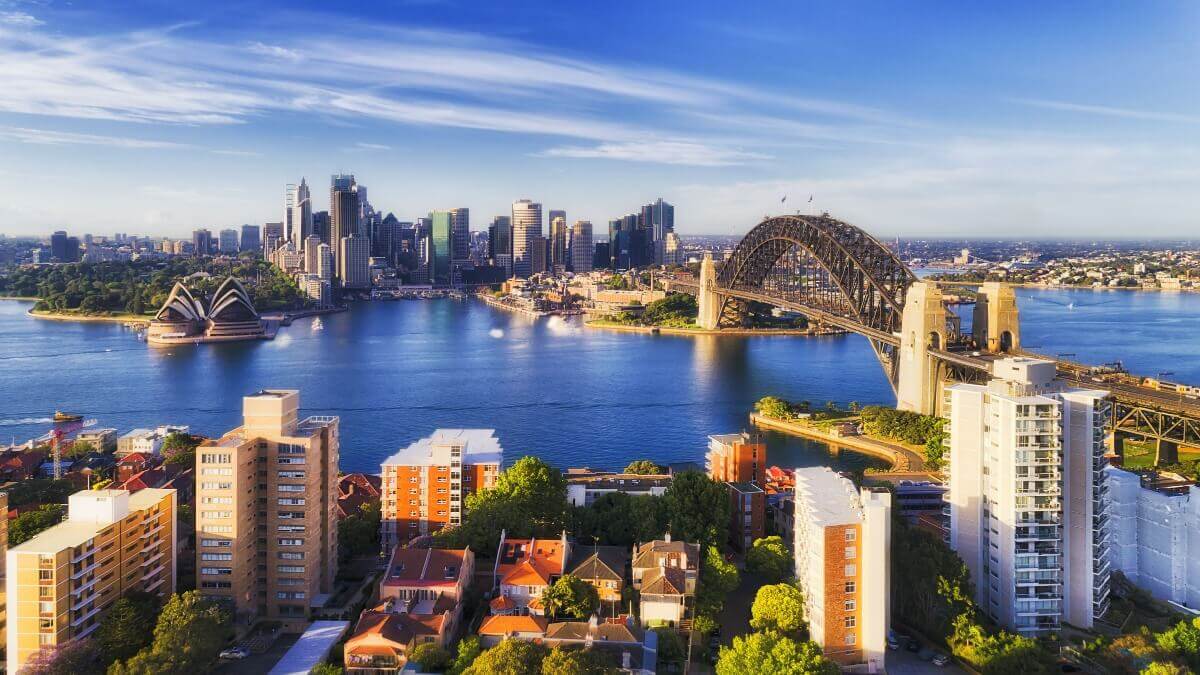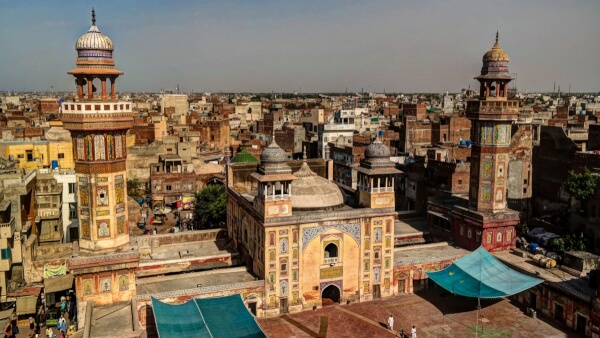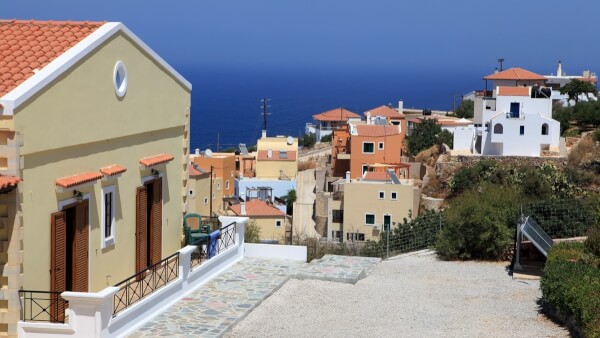Property tax in Greece for foreigners (UK guide)
Read our essential guide to property tax in Greece for foreigners and UK expats, including taxes on buying, selling and renting out property.

Planning a move to Australia? If you’re a UK expat looking to settle Down Under, you’re going to need somewhere to live. And for most people, this means buying a home with the help of a mortgage.
But how easy is getting a mortgage in Australia from the UK? Do you need to be a resident, and what documents do you need to provide?
We’ll answer these questions and much more here in this essential guide. Plus, info on mortgage rates, fees and a step-by-step look at the application process.
Also, if you’re looking for ways to save money on currency exchange when sending a down payment or mortgage fees to Australia, check out the money services provider Wise.
You can send large transfers with Wise for low fees* and great mid-market exchange rates - making it ideal if you’re sending a secure international transfer.
It is technically possible to get a non-resident mortgage in Australia if you’re not living there, but it is likely to be more difficult. You will face more restrictions and conditions, along with higher interest rates. You also won’t be able to borrow as much as an Australian citizen or permanent resident.
As a guide, you may only be able to borrow 60% to 70% of the property’s value, which means you’ll need a deposit/down payment of up to 40%.¹
Generally speaking, lenders in Australia prefer applicants who have permanent residency - seeing this as a sign of stability and a lower risk. So you might find that you have to try a few banks and lenders before you find one that will approve your application.
As a foreign citizen, you will also need to successfully apply for permission to buy property in Australia from the Foreign Investment Review Board (FIRB) before you can get a mortgage and proceed with a purchase.¹
The UK leaving the EU has had no effect on the process of getting a mortgage in Australia as a British citizen.
When it comes to lenders, you should be treated the same as any other foreign national. Although unfortunately, this may mean more paperwork, stricter requirements and less favourable rates compared to Aussie locals.
The criteria for mortgage applications will vary between lenders.
But generally speaking, you may need to meet the following requirements to apply for a mortgage in Australia as a UK national:¹
If you’re a permanent resident/Australian citizen and meet the lender’s criteria, getting a mortgage in Australia can be relatively straightforward. Be prepared for plenty of paperwork though, along with detailed questions about your income and spending habits.
However, if you’re a temporary resident or are buying from abroad, you’re likely to find it much more difficult. Lenders are likely to see you as higher risk, especially if you don’t have any kind of credit history in Australia.
You might also face obstacles if you have a poor credit history, a high debt-to-income ratio or gaps in your employment history. Self-employed people sometimes struggle to secure a mortgage.
It could be a good idea to use the services of a specialist broker, who can help you navigate these challenges and find a lender willing to grant you a mortgage.
To give you an idea of what to expect, here’s a step-by-step look at the process of applying for an Australian mortgage as a UK national:
Once this is done, you can get on with the legal and other steps involved in buying your Australian home.
| 💡 Read more: Taking cash in or out of the UK: What are the rules? |
|---|
The exact paperwork you'll need will depend on the bank or lender you use. However, you can expect to be asked for the following:²
All of these documents should be provided to the bank to get a mortgage pre-approval, which means that they agree how much they would lend you if you find a suitable property.
Once you have an offer accepted on a home you’ll have to sort out more paperwork, such as FIRB approval for the specific property.
Getting pre-approval for an Australian mortgage generally only takes a few days. ³
But from approval to settlement (when the loan is granted), you can expect it to take around 4 to 6 weeks.³
So, it’s smart to apply as early as possible, to prevent any delays in purchasing your new home.
You can expect a few different fees when applying for an Australian mortgage.
They include:
We’ll look at these in a little more detail below, along with a guide to estimated costs for each.
This is the fee associated with applying for or completing your mortgage. The amount varies by lender and product, but generally costs between $150 and $800 AUD. Some lenders don’t charge a fee, or waive it under certain circumstances.
If the mortgage company needs to carry out a valuation of the property, they may charge an appraisal fee. It’s a one-time fee of around $100 to $600 AUD, but varies depending on the value, location and types of property.
You’ll already be paying legal fees to the property lawyer assisting you with the sale, but your mortgage lender may also charge separate conveyancing and legal fees.
Conveyancing fees may range from $500 to $2,200 AUD, while other legal fees may amount to between $200 to $450 AUD.
Each state or territory in Australia will charge a fee to register the mortgage on the property. They set their own fees, but it ranges between around $132 AUD to $224 AUD.
You may also encounter some of these other charges when applying for an Australian mortgage loan:⁴
Many of Australia’s major banks don’t provide mortgages to non-residents and property buyers who need FIRB approval. So if you’re buying from outside the country, you may need to look for a non-bank or specialist lender.
If you’re a permanent resident, you can approach banks such as:
You’ll need to find out their eligibility criteria and requirements, and if they lend to foreigners living in Australia.
It may also be worth contacting HSBC, as it’s an international bank with a presence in both the UK and Australia. It offers many products and services for expats, so may be able to help you secure a mortgage in Australia.
| 💡 Read more: How to transfer large sums of money between bank accounts? |
|---|
According to personal finance comparison site Money.com.au, here are some of the best home loan rates available in Australia right now:⁵
| Mortgage type | Interest rate (as of 6th Dec 2024) |
|---|---|
| Variable rate (p.a.) | 5.60% |
| 1 year fixed rate (p.a.) | 5.74% |
| 2 year fixed rate (p.a.) | 5.49% |
| 3 year fixed rate (p.a.) | 4.99% |
| 4 year fixed rate (p.a.) | 5.49% |
There are a couple of things to bear in mind though. Firstly, these average rates are accurate at the time of writing (06/12/24) but they change regularly. You’ll need to check the updated rates when you’re ready to apply for your mortgage.
The rate you’re offered will also depend on your circumstances and eligibility, the amount you’re borrowing and how much of a deposit you have. Non-residents can usually expect less preferential terms than residents and Australian citizens, which could mean higher interest rates.
It may be possible to get a mortgage in the UK to finance your property purchase over in Australia. But not all UK banks and lenders offer what are often known as ‘overseas mortgages’.
Your best bet would be to try an international bank which operates in both countries, such as HSBC.
You could also look at remortgaging an existing property you own in the UK, borrowing more to raise funds for your overseas purchase. Crucially, you should only do this if you can afford the repayments. It could be a sensible idea to seek financial advice before going down this route.
Banks in Australia offer home loans specially designed for investing in property, but they’re not generally called Buy-to-Let mortgages like they are in the UK.
You’ll need to research a few different banks and lenders to find out what options are available for budding property investors and landlords.
It’s also possible to refinance a mortgage in Australia, which is more commonly known as ‘remortgaging’ here in the UK.
There are a few reasons you might want to do this. For example, you can unlock equity from your home, lower your payments or shorten the term of your loan.
Refinancing can also help you borrow more money for a specific purpose, such as to buy another property or start a business. You’ll just need to make sure you can afford the repayments and aren’t overstretching yourself.
As with anything to do with mortgages, it could be a good idea to get professional financial advice before refinancing.
There are a few different mortgage types available in Australia, and it’s important to choose the right one for your circumstances. The good news though is that most types are similar to mortgage products you’ll find here in the UK, so you may be familiar with how they work.
The main types to know about are:
A fixed rate mortgage has a fixed interest rate for a set period, which in Australia is usually between 1 and 5 years.¹ As the rate stays the same, your monthly repayments won’t change.
This type of mortgage has a variable interest rate, which may fluctuate due to changes in the banking market or wider economic situation. With variable rate mortgages, your monthly payments may rise or fall.
A split-rate mortgage combines features of both variable and fixed rate products. You can usually decide how much of the mortgage is subject to a fixed rate, and how much a variable rate.
Unlike other mortgage types where you pay back what you’ve borrowed plus interest, this kind of mortgage only involves repaying the interest on the loan - usually for a set period of time.
This means that during this period, the principal sum you’ve borrowed won’t decrease. So it can take longer to repay the loan, as you won’t have started on repayments until you switch to another kind of mortgage.
To stand the best chance of getting accepted for an Australian mortgage as a non-resident, bear these tips in mind:
If you’re sending your deposit and mortgage fees to Australia from the UK, you may incur hefty transfer and exchange fees when converting your British pounds to dollars (AUD). This is where Wise and the Wise account can help you save money.
Open a Wise account online and you can start managing your money in currencies (including GBP and AUD). It’s not a bank account and offers customers an alternative option to a conventional bank account, but has similar features.
Here’s an overview of the main benefits for using Wise: |
|---|
|
Sources used:
Sources last checked on date: 06-Dec-2024
*Please see terms of use and product availability for your region or visit Wise fees and pricing for the most up to date pricing and fee information.
This publication is provided for general information purposes and does not constitute legal, tax or other professional advice from Wise Payments Limited or its subsidiaries and its affiliates, and it is not intended as a substitute for obtaining advice from a financial advisor or any other professional.
We make no representations, warranties or guarantees, whether expressed or implied, that the content in the publication is accurate, complete or up to date.

Read our essential guide to property tax in Greece for foreigners and UK expats, including taxes on buying, selling and renting out property.

Read our essential guide to buy-to-let mortgages for non-UK residents, including which providers offer them, eligibility requirements and costs.

Read our essential guide to property tax in India for foreigners and UK expats, including taxes on buying, selling and renting out property.

Read our essential guide to property tax in Pakistan for foreigners and UK expats, including taxes on buying, selling and renting out property.

How much does it cost to build a house in Poland as a UK expat? Find out in our essential guide, covering everything you need to know.

How much does it cost to build a house in Greece as a UK expat? Find out in our essential guide, covering everything you need to know.